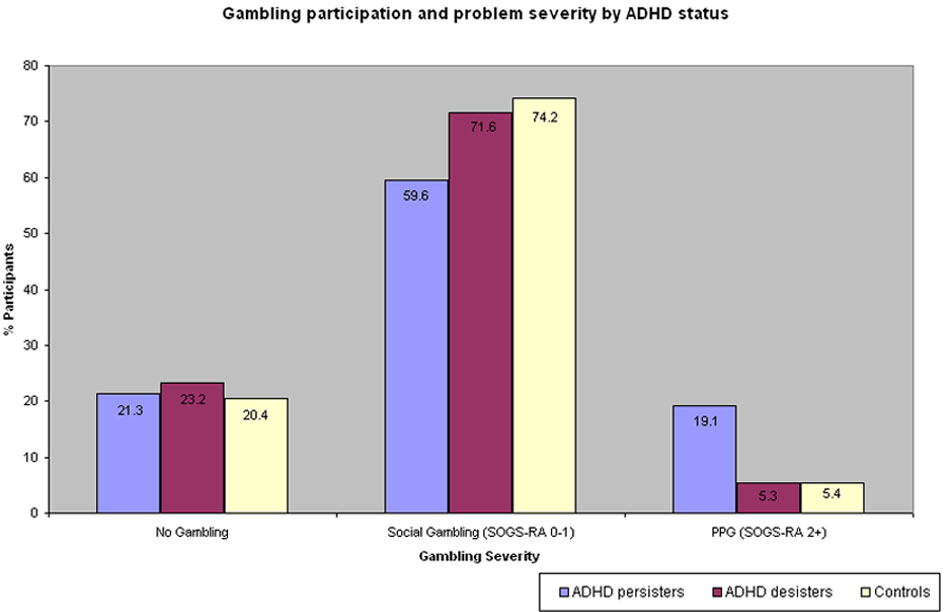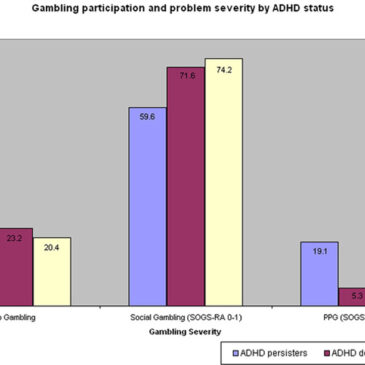A number of studies (Carlton & Manowitz, 1992; Carlton et al., 1987; Rugle & Melamed, 1993) have shown an association between symptoms of Attention Deficit Hyperactivity Disorder (ADHD) in childhood and pathological gambling behavior during adulthood. The majority of these studies have retrospective designs, and examine past ADHD symptoms after the development of pathological gambling behavior. These study designs are susceptible to considerable recall bias and leave the causal relationship between ADHD and problem gambling unclear. This week’s WAGER reviews a prospective study (Breyer et al., 2009), which attempts to illuminate the relationship between persistent ADHD and gambling behaviors from childhood through young adulthood .
Methods
The study sample included participants involved with a childhood longitudinal ADHD study (i.e., the Minnesota Competence Enhancement Program).
- At baseline (ages 7-11):
- N (ADHD) = 318; N (Control) = 144
- At follow-up (ages 18- 24):
- N (ADHD) = 142, a 45% follow-up (FU) rate; N (Control) = 93, a 65% FU rate.
- Significantly fewer ADHD cases than controls participated in the follow-up assessment (X² = 11.7, p = 0.008)
- Investigators assessed childhood ADHD status using the Revised Parent Version of the Diagnostic Interview for Children and Adolescents; at follow-up they assessed ADHD status using the Adolescent Diagnostic Interview.
- At follow-up, researchers identified two subgroups of ADHD cases, ADHD “persisters” (i.e., those with a diagnoses both at baseline and follow-up; N = 47) and ADHD “desisters” (i.e., those with a diagnoses at baseline but not at follow-up; N = 95).
- Researchers used the South Oaks Gambling Screen – Revised for Adolescents (SOGS-RA) to assess gambling behavior at follow-up.
- Investigators categorized participants with scores of 0-1 as “social gamblers” and those with scores of 2+ as “possible problem gamblers” (PPGs).
- Researchers performed ANOVAs and Chi-square analyses to examine relationships between ADHD status and gambling outcome variables.
Results
- There were no significant subgroup differences in gambling participation or frequency between persisters, desisters, and controls.
- Persisters had significantly higher rates of PPG.
- A significantly higher percentage of persisters (19.1%) met the criteria for PPG than desisters (5.3%) and controls (5.4%; X² (4) = 10.05; p < 0.05). See Graph 1.
Figure 1. Gambling participation and problem severity by ADHD status
(Adapted from Breyer et al, 2009) 
Limitations
- Gambling behavior and ADHD status were assessed via self report.
- Sample was predominantly Caucasian (95%).
- Significant differential loss to follow-up between ADHD cases and controls between baseline and reassessment.
- Study did not examine ADHD co-occurring disorders, particularly externalizing disorders (e.g., those that effect impulsivity and self-control), which might confound the relationship between gambling behavior and ADHD.
Conclusion
Despite the limitations of this study, this research provides important longitudinal evidence about the relationship between persistent ADHD and disordered gambling. Among study participants, those with persistent ADHD have a higher prevalence of PPG during young adulthood; however, a causal relationship between ADHD and gambling problems remains uncertain. We cannot conclude a causal relationship because the factors contributing to ADHD or the characteristics of persistent ADHD (i.e., potential mediators and moderators) might also increase vulnerability to PPG. Further, the low occurrence of PPG makes it difficult to evaluate these potential mediators and moderators. Future research will need to address the limitations of this study (e.g., larger, more ethnically/racially diverse sample, assessment of ADHD co-occurring disorders) to fully understand the causal relationship between persistent ADHD and disordered gambling behaviors.
– Erica Marshall
What do you think? Please use the comment link below to provide feedback on this article.
References
Breyer, J. L., Botzet, A. M., Winters, K. C., Stinchfield, R. D., August, G., & Realmuto, G. (2009). Young Adult Gambling Behaviors and their Relationship with the Persistence of ADHD. Journal of Gambling Studies.
Carlton, P. L., & Manowitz, P. (1992). Behavioral restraint and symptoms of attention deficit disorder in alcoholics and pathological gamblers. Neuropsychology, 25, 44-48.
Carlton, P. L., Manowitz, P., McBride, H., Nora, R., Swartzburg, M., & Goldstein, L. (1987). Attention deficit disorder and pathological gambling. The Journal of Clinical Psychiatry, 48(12), 487-488.
Rugle, L., & Melamed, L. (1993). Neuropsychological assessment of attention problems in pathological gamblers. The Journal of Nervous and Mental Disease, 181(2), 107-112.




